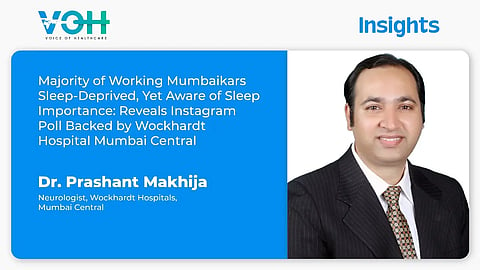

A recent Instagram survey conducted among working Mumbaikars aged 30 to 55 years has shed light on alarming sleep trends and perceptions in the city that never sleeps. The poll, supported by insights from Dr. Prashant Makhija, Consultant Neurologist at Wockhardt Hospitals, Mumbai Central, highlights not just the sleep deprivation crisis but also the growing awareness around sleep health.
Dr. Prashant Makhija explains:
“Sleep deprivation has become rampant in metros like Mumbai. What's alarming is that people recognize six hours as insufficient, yet daily demands prevent them from achieving more.”
● 64.23% admitted they struggle to sleep due to Mumbai's noise pollution, such as honking, construction, and loud neighbors.
Dr. Makhija comments:
“Environmental factors like urban noise disrupt circadian rhythms and REM sleep, leading to long-term consequences such as anxiety, hypertension, and weakened immunity.”
3. The Weekend Catch-Up Myth
● 59.62% believe that sleeping extra on weekends compensates for weekday loss.
Dr. Makhija warns:
“This is a common misconception. While you may feel better temporarily, it doesn't reverse the cumulative effects of chronic sleep loss.”
● When asked about pre-bedtime habits, 75.40% preferred a relaxed routine, while only 24.60% scrolled social media.
● Additionally, 55.74% said they don’t sacrifice sleep for late-night food or social plans.
“This is an encouraging insight,” says Dr. Makhija.
“Despite distractions like social media and nightlife, Mumbaikars do attempt to maintain a sleep-friendly routine. It's just that external pressures interfere.”
● 53.23% considered snoring to be normal, reflecting a serious lack of awareness.
● In reality, snoring can be a sign of obstructive sleep apnea (OSA), a condition with grave health risks.
“People often overlook snoring,” warns Dr. Makhija.
“But it can indicate upper airway obstruction. Left untreated, OSA can increase the risk of heart disease and stroke.”
●Only 52.66% acknowledged the link between inadequate sleep and physical or mental health.
● Alarmingly, nearly 47% either denied or were unsure of the connection.
Dr. Makhija emphasizes:
“This gap in awareness is concerning. Sleep is not a luxury—it is foundational to brain health, hormonal balance, and emotional regulation.”
● 44.89% reported relying on chai or coffee to stay awake during the day, while the rest managed without caffeine—a surprisingly balanced outcome.
Conclusion: A City That Knows, But Can’t Sleep
The results reveal a city aware of its sleep needs but struggling to meet them due to environmental, social, and occupational stressors. With nearly 2 in 3 respondents being sleep-deprived, it’s evident that public health interventions, noise regulation, and educational efforts are urgently needed.
“It’s time we treat sleep as a pillar of health, not an afterthought,” concludes Dr. Makhija.